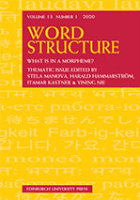
Word Structure
Scope & Guideline
Unraveling the Mechanics of Word Structure
Introduction
Aims and Scopes
- Morphological Analysis and Theoretical Frameworks:
The journal emphasizes the exploration of morphological structures and their theoretical implications, often employing both qualitative and quantitative methodologies to analyze word formation processes. - Cross-Linguistic Studies:
A consistent focus on comparative studies across languages allows for the examination of morphological phenomena such as agreement, inflection, and derivation in diverse linguistic contexts. - Empirical Research Using Corpora:
The journal showcases a strong commitment to empirical research, utilizing language corpora to derive insights about morphological patterns and usage in real-world language data. - Acquisition and Processing of Morphology:
Research often delves into how morphological knowledge is acquired, processed, and represented in the mind, including studies on language development and cognitive aspects of morphology. - Morphological Variation and Change:
The journal addresses issues of morphological variation and the effects of language contact, typological change, and sociolinguistic factors on morphological systems.
Trending and Emerging
- Corpus-Based Morphological Studies:
There is a marked increase in studies utilizing corpus data to analyze morphological patterns, reflecting a growing trend towards empirical methodologies that provide robust insights into language use. - Morphological Rivalry and Competition:
Emerging research focuses on the dynamics of morphological rivalry, including affix competition and the impact of linguistic and non-linguistic factors, which indicates a deeper exploration of how morphological elements interact. - The Intersection of Morphology and Syntax:
Recent papers have emphasized the relationship between morphology and syntax, particularly in the context of agreement systems, signaling a trend towards interdisciplinary approaches that bridge different areas of linguistics. - Language Contact and Morphological Change:
Research examining the effects of language contact on morphological structures is increasing, highlighting the relevance of sociolinguistic factors and typological changes in contemporary morphological studies. - Acquisition of Complex Morphological Systems:
A growing interest in how complex morphological systems are acquired, particularly in languages with rich inflectional paradigms, indicates a trend towards understanding the cognitive aspects of morphology.
Declining or Waning
- Traditional Morphological Descriptions:
Papers focusing solely on traditional morphological descriptions without empirical support or innovative theoretical perspectives have become less common, indicating a shift towards more data-driven and analytical approaches. - Historical Morphology Studies:
Research centered on historical or diachronic aspects of morphology has shown a decline, possibly due to a growing preference for synchronic studies that provide immediate relevance to current linguistic practices. - Exclusively Theoretical Contributions Without Empirical Data:
There is a noticeable decrease in purely theoretical discussions lacking empirical backing, suggesting a trend towards integrating theoretical frameworks with real-world data.
Similar Journals

Turkic Languages
Illuminating the Cultural Contexts of Turkic LanguagesTurkic Languages is an esteemed academic journal published by HARRASSOWITZ VERLAG, dedicated to the exploration and analysis of Turkic languages within the broader fields of linguistics and language studies. With an ISSN of 1431-4983, this journal serves as a vital platform for researchers, professionals, and students interested in the intricate structures, dynamics, and cultural contexts of Turkic languages. Although it currently operates without an Open Access option, the journal's commitment to quality research is evident in its placement within the Q4 category of Linguistics and Language for 2023, alongside its Scopus rankings where it stands in the 30th and 26th percentiles for Language and Linguistics across Arts and Humanities and Social Sciences, respectively. The journal's scope encompasses a variety of linguistic phenomena, striving to foster a deeper understanding of Turkic languages and their significance in the global linguistic landscape. With converged years from 2017 to 2022, Turkic Languages continues to uphold its reputation as a crucial resource for advancing scholarship in this specialized field.

SKASE Journal of Theoretical Linguistics
Expanding the Frontiers of Linguistic ThoughtSKASE Journal of Theoretical Linguistics, published by the SLOVAK ASSOCIATION STUDY ENGLISH-SKASE, is a distinguished Open Access journal that expands the horizons of linguistic research and theoretical frameworks. With its ISSN N/A and E-ISSN 1336-782X, the journal has established itself as a pivotal resource for scholars in the field, achieving a commendable Q2 ranking in Linguistics and Language as of 2023. The journal, which has been in continuous publication since 2017, actively publishes innovative research studies, reviews, and theoretical discussions, easing access to groundbreaking work for academics and practitioners alike. Based in Slovakia, it connects a rich heritage of linguistic scholarship and is indexed in Scopus, ranking alongside its peers in both Arts and Humanities and Social Sciences categories. The SKASE Journal of Theoretical Linguistics is crucial for anyone interested in the evolving landscapes of linguistics, serving as an invaluable platform for disseminating knowledge and fostering collaboration amongst researchers worldwide.

Acta Linguistica Academica
Advancing Knowledge in Linguistics and Literary TheoryActa Linguistica Academica is a distinguished academic journal published by Akademiai Kiado ZRT, located in Hungary. Since its inception in 2017, the journal has occupied a premier position in its field, achieving Q1 rankings in both Cultural Studies and Linguistics and Language, as well as in Literature and Literary Theory in 2023. With an impressive Scopus ranking placing it in the top percentiles across various categories, Acta Linguistica Academica stands out as a vital resource for researchers, professionals, and students dedicated to exploring the nuances of language, literature, and cultural dynamics. The journal provides a platform for high-quality research and diverse perspectives, facilitating the dissemination of innovative ideas and comprehensive analyses in these disciplines. As an esteemed open-access journal, it ensures that cutting-edge research is readily available to the academic community and the public at large, affirming its commitment to accessibility and knowledge sharing.

Snippets
Connecting researchers and ideas for a brighter intellectual future.Snippets is an esteemed academic journal published by LED EDIZIONI UNIV, known for its commitment to advancing knowledge across various disciplines. The journal, which carries the ISSN 1590-1807, serves as a crucial platform for researchers, professionals, and students in the fields of humanities, social sciences, and applied sciences. With an increasing emphasis on open-access content, Snippets offers a wealth of information and insights aimed at fostering academic dialogue and innovation. Although specific metrics like impact factor and H-index are yet to be established, the journal is dedicated to providing high-quality research outputs that contribute to the enrichment of scholarly pursuits. Based in Milan, Italy, Snippets welcomes contributions from a diverse range of perspectives, thus enhancing interdisciplinary collaboration and promoting a deeper understanding of contemporary issues.
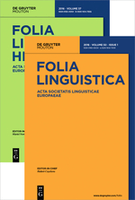
FOLIA LINGUISTICA
Advancing Linguistic Knowledge Since 1967FOLIA LINGUISTICA, published by WALTER DE GRUYTER GMBH, is a premier scholarly journal dedicated to the field of linguistics. Established in 1967, the journal has consistently provided a platform for innovative research and scholarly discourse in language and linguistics, contributing significantly to the academic community's understanding of language structures, usage, and cognitive processes. With its classification in the top quartile (Q1) of linguistics and language in 2023, FOLIA LINGUISTICA holds a respectable rank (#282/1088) within the Arts and Humanities category and an admirable percentile rank of 74th, ensuring its position at the forefront of linguistic scholarship. Researchers and academics from around the globe can access a wealth of knowledge and cutting-edge research findings through this esteemed publication, which is vital for anyone looking to engage with the latest advancements in linguistics. Located in Berlin, Germany, FOLIA LINGUISTICA encompasses all aspects of language research, making it an indispensable resource for researchers, professionals, and students alike seeking to deepen their understanding of language and its complexities.

Journal of Greek Linguistics
Connecting Language, Culture, and Society in Greek StudiesThe Journal of Greek Linguistics, published by BRILL, is a premier platform dedicated to advancing the study of Greek language and its historical and contemporary implications within the broader field of linguistics. With an impact factor recognized in the linguistics community, this journal significantly contributes to the academic discourse surrounding Greek linguistics and its relevance in cultural and social studies. First made open access in 2016, it is now accessible to a global audience, facilitating a collaborative environment for researchers, scholars, professionals, and students alike. The journal is proudly positioned in the Q2 quartile for linguistics and language, reflecting its esteemed standing in the academic community, and it ranks within the top 30% in both the Arts and Humanities and Social Sciences categories according to Scopus. With a focus on the intersection of language, culture, and society, the journal invites contributions that offer new insights and promote interdisciplinary research. The Journal of Greek Linguistics continues to be an essential resource for those engaged in the rich and evolving conversation about the Greek language.
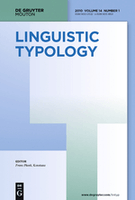
Linguistic Typology
Transforming Understanding of Global Linguistic PhenomenaLinguistic Typology is a premier journal focused on the comparative study of language structures and the classification of languages, published by Walter de Gruyter GmbH in Germany. Since its inception in 1997, the journal has established itself as a leading platform in the field of linguistics, achieving a remarkable Q1 category ranking in both Linguistics and Language for 2023, reflecting its impact and relevance among scholars. With a notable position in the academic community, evidenced by its 91st percentile rank in Arts and Humanities and 90th percentile in Social Sciences according to Scopus, Linguistic Typology invites contributions that explore the rich diversity of language structures, promoting a deeper understanding of linguistic phenomena across various cultures. While currently not offering open access, the journal remains a pivotal resource for researchers, professionals, and students aiming to advance their knowledge in the dynamic field of linguistics. For more information, deliverables, and submission guidelines, please visit the journal's official page.

Italian Journal of Linguistics
Connecting scholars through impactful linguistic studies.Italian Journal of Linguistics is a prominent academic journal published by PACINI EDITORE, dedicated to advancing the understanding of linguistic theory and application. With its inception in 1996, the journal has fostered scholarly discourse and continues to contribute to the field through rigorous peer-reviewed articles. Operating under the prestigious field of linguistics, the journal currently holds a respectable Q3 quartile ranking as of 2023, showcasing its relevance in the academic community. It also ranks in the top 30% of journals in both Arts and Humanities and Social Sciences disciplines, reflecting its impactful contributions documented in Scopus rankings. While the Italian Journal of Linguistics is not an open-access journal, it offers invaluable insights and innovative research findings, making it an essential resource for researchers, professionals, and students keen on exploring the nuances of language and linguistics. Based in Pisa, Italy, the journal serves as a significant platform for both contemporary studies and classic investigations in linguistics, appealing to an international audience devoted to this ever-evolving field.
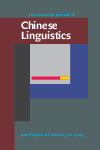
International Journal of Chinese Linguistics
Elevating Chinese Linguistics to Global StandardsInternational Journal of Chinese Linguistics is a distinguished publication that delves into various aspects of linguistic studies pertaining to the Chinese language. Published by John Benjamins Publishing Co, this journal stands out for its commitment to advancing the knowledge and understanding of Chinese linguistics within the global academic community. With an impact factor that places it in the Q2 quartile of linguistics and language, the journal is indexed in prominent databases, achieving ranks of #501 in Arts and Humanities and #580 in Social Sciences. These rankings reflect the journal's dedication to maintaining high scholarly standards and its relevance in both linguistic research and practical applications. While not categorized as Open Access, the journal provides necessary access through institutional subscriptions, thereby ensuring that valuable research reaches a broad audience. Covering a wide range of topics from syntax and phonetics to sociolinguistics and applied linguistics, the International Journal of Chinese Linguistics serves as an essential resource for researchers, professionals, and students seeking to deepen their understanding of the intricate relationship between language and culture in the Chinese context. With converging years from 2019 to 2024, it continues to evolve, reflecting ongoing developments in the field.
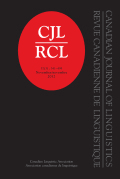
CANADIAN JOURNAL OF LINGUISTICS-REVUE CANADIENNE DE LINGUISTIQUE
Connecting researchers and ideas in the world of linguistics.The Canadian Journal of Linguistics - Revue canadienne de linguistique is a prestigious peer-reviewed publication dedicated to advancing the field of linguistics. Published by Cambridge University Press, this journal has firmly established itself as a vital resource for researchers, professionals, and students alike, offering insights into a diverse range of linguistic studies and theories. With an impressive impact factor reflecting its academic rigor, the journal is ranked Q2 in the categorization of linguistics and language as of 2023, and holds commendable positions in both Scopus ranks for Arts and Humanities as well as Social Sciences. The journal's converged years span from 1996 to 2024, showcasing a rich history of contributions to the discipline. Although it currently does not offer open access, it remains highly influential. Located in Canada, the journal plays a crucial role in fostering scholarly communication within the linguistic community, making it an essential outlet for disseminating groundbreaking research and engaging discussions.